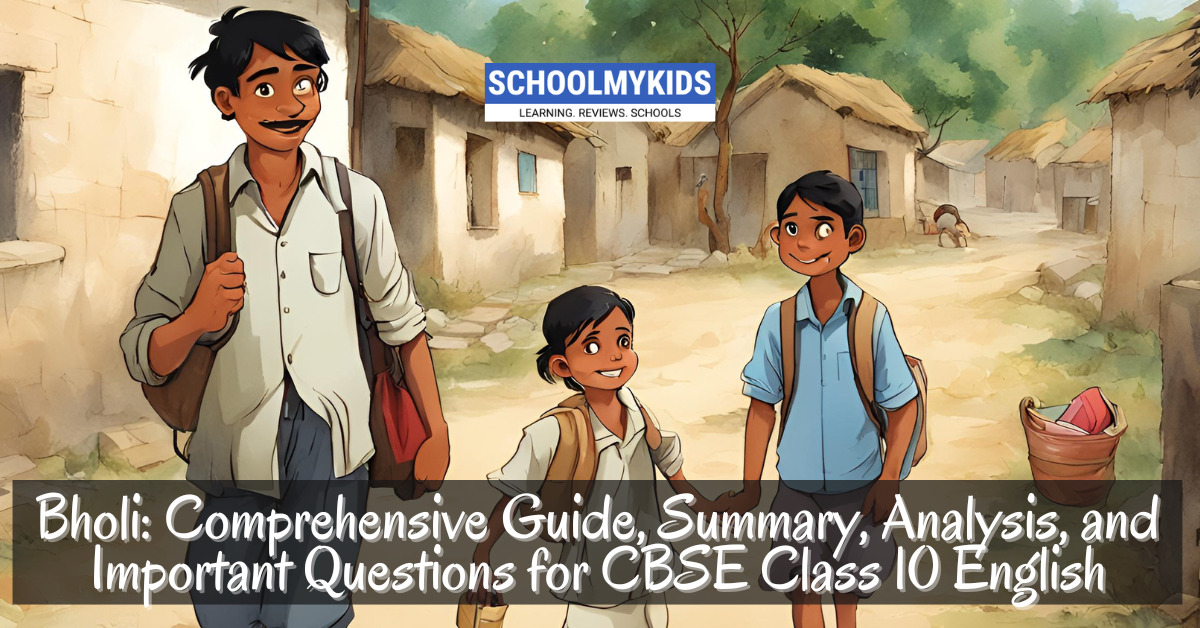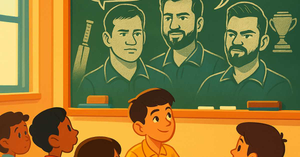“Bholi” is a chapter from the Class 10 CBSE English textbook, “Footprints without Feet”
Summary
“Bholi” is a heartwarming story by K.A. Abbas, included in the CBSE Class 10 English curriculum. The story revolves around a young girl named Bholi, who overcomes various challenges to transform from a timid, neglected child into a confident and self-assured individual. The narrative highlights themes of education, empowerment, and societal attitudes towards women and physical appearance.
Bholi, whose real name is Sulekha, is the youngest daughter of Ramlal, a revenue official in the village. Unlike her siblings, Bholi is not only backward in her mental development but also has pockmarks on her face due to smallpox, making her the target of ridicule and neglect. She is called “Bholi” because of her simplicity and lack of intelligence.
Her parents, especially her mother, are indifferent towards her, considering her a burden. However, her father eventually decides to send her to school, partly because the village headman insists on it. Bholi’s initial experiences at school are terrifying, but the kind and encouraging teacher, who treats her with compassion, gradually helps her gain confidence.
Education transforms Bholi. She learns to read and write, and her self-esteem grows. When she becomes an adult, her parents arrange her marriage to Bishamber, a much older man, who demands a hefty dowry because of her appearance. At the wedding, Bishamber humiliates her by demanding more dowry upon seeing her face covered with pockmarks.
In a bold move, Bholi refuses to marry Bishamber, standing up for her self-respect and dignity. Her decision shocks everyone, but it also signifies her transformation from a meek, scared girl to a confident woman who values herself. She decides to stay with her parents and dedicate her life to teaching, following in the footsteps of her kind teacher.
Analysis
“Bholi” is a powerful narrative that highlights the transformative power of education and self-respect. The story is a critique of societal norms that judge individuals, especially women, based on their physical appearance and submissiveness. It underscores the importance of inner strength and self-belief in overcoming societal prejudices.
The character of Bholi is central to the story. Her journey from a neglected, insecure girl to a confident, independent woman is both inspiring and thought-provoking. Her initial portrayal as a timid, unattractive girl evokes empathy, while her transformation highlights the pivotal role of education and supportive mentorship in personal development.
The story also sheds light on the harsh realities of dowry and the discrimination faced by women in rural India. Bishamber’s demand for dowry and his reaction upon seeing Bholi’s face reflect the deep-seated prejudices and materialistic attitudes prevalent in society. Bholi’s refusal to accept these injustices is a powerful statement against such practices.
The role of Bholi’s teacher is crucial. Her kindness, encouragement, and belief in Bholi’s potential play a significant role in Bholi’s transformation. The story emphasizes the impact a compassionate and supportive mentor can have on a person’s life.
Important Questions with Explanations
- What is the central theme of “Bholi”?
- The central theme is the transformative power of education and self-respect. The story highlights how education can empower individuals to overcome societal prejudices and assert their dignity.
- Describe Bholi’s character development throughout the story.
- Bholi transforms from a timid, neglected girl to a confident, independent woman. Her journey is marked by her gaining self-esteem and courage through education and the support of her teacher.
- How does Bholi’s physical appearance affect her life?
- Bholi’s pockmarked face and perceived lack of intelligence make her a target of ridicule and neglect. These factors influence how others treat her and how she perceives herself until her transformation.
- What role does Bholi’s teacher play in her transformation?
- Bholi’s teacher plays a crucial role by treating her with kindness and encouragement. She helps Bholi gain confidence and realize her potential, leading to Bholi’s transformation.
- Discuss the significance of the story’s title, “Bholi”.
- “Bholi” means simple or naive, reflecting the initial perception of Bholi’s character. The title signifies her innocence and simplicity, which evolve into strength and self-awareness by the end.
- How does the story critique societal attitudes towards women and physical appearance?
- The story criticizes the superficial judgments and discrimination based on physical appearance. Bholi’s journey highlights the injustice of these attitudes and the importance of inner qualities and self-respect.
- What is the impact of Bholi’s refusal to marry Bishamber?
- Bholi’s refusal is a bold assertion of her self-respect and dignity. It challenges societal norms and the dowry system, showing her transformation and inner strength.
- Analyze the character of Ramlal in the story.
- Ramlal is a conflicted character who cares for Bholi but is influenced by societal norms. He eventually supports her education but arranges her marriage to Bishamber, highlighting the pressures of societal expectations.
- What message does the story convey about the dowry system?
- The story condemns the dowry system as unjust and discriminatory. Bishamber’s demand for dowry and Bholi’s refusal to accept it critique this practice and its impact on women.
- How does Bholi’s education contribute to her empowerment?
- Education gives Bholi knowledge, confidence, and the ability to think critically. It empowers her to stand up for herself and reject societal injustices, transforming her life.
- Discuss the theme of self-respect in “Bholi”.
- Self-respect is a key theme, as Bholi’s journey is about gaining self-esteem and asserting her dignity. Her refusal to marry Bishamber is a significant act of self-respect.
- How do Bholi’s parents view her initially, and how does this change?
- Initially, Bholi’s parents see her as a burden and treat her with neglect. Their perception changes slightly with her education, but they still consider her marriage a way to offload responsibility until she asserts her independence.
- What does Bholi’s decision to stay with her parents and become a teacher signify?
- Bholi’s decision signifies her commitment to using her education to help others and her rejection of societal norms that undervalue women. It highlights her transformation and independence.
- How does K.A. Abbas use irony in the story?
- The irony is evident in Bholi’s transformation from a neglected child to an empowered woman who rejects societal norms. Her parents’ attempts to marry her off to someone who mistreats her backfire as she asserts her dignity.
- What role does the village setting play in the story?
- The village setting highlights the traditional and conservative attitudes towards women and education. It contrasts with Bholi’s progressive transformation and the change she brings to her own life.
- Analyze the relationship between Bholi and her siblings.
- Bholi’s siblings are more favored and successful, contrasting with her initial position. This dynamic underscores her initial struggles and the significant impact of her transformation.
- What does Bholi’s name change from Sulekha to Bholi symbolize?
- The name change symbolizes societal perception and expectations. “Bholi” reflects her initial simplicity and lack of confidence, which evolves as she grows and asserts her identity.
- How does the story address the issue of gender discrimination?
- The story addresses gender discrimination through Bholi’s experiences of neglect and her parents’ attitudes. Her empowerment and refusal to accept injustice challenge these discriminatory norms.
- What is the significance of education in Bholi’s life?
- Education is the catalyst for Bholi’s transformation. It provides her with the tools to gain confidence, assert her rights, and challenge societal norms, leading to her empowerment.
- What overall message does “Bholi” convey?
- “Bholi” conveys that education and self-respect are powerful tools for empowerment. It critiques societal attitudes towards women and physical appearance, highlighting the importance of inner strength and dignity.
Conclusion
“Bholi” by K.A. Abbas is an inspiring story that explores themes of education, empowerment, and societal attitudes towards women and physical appearance. Through Bholi’s journey, the narrative highlights the transformative power of education and the importance of self-respect. For students preparing for the CBSE Class 10 English exam, understanding this story provides valuable insights into character development, thematic exploration, and narrative techniques, enriching their literary knowledge and analytical skills.









Be the first one to comment on this story.